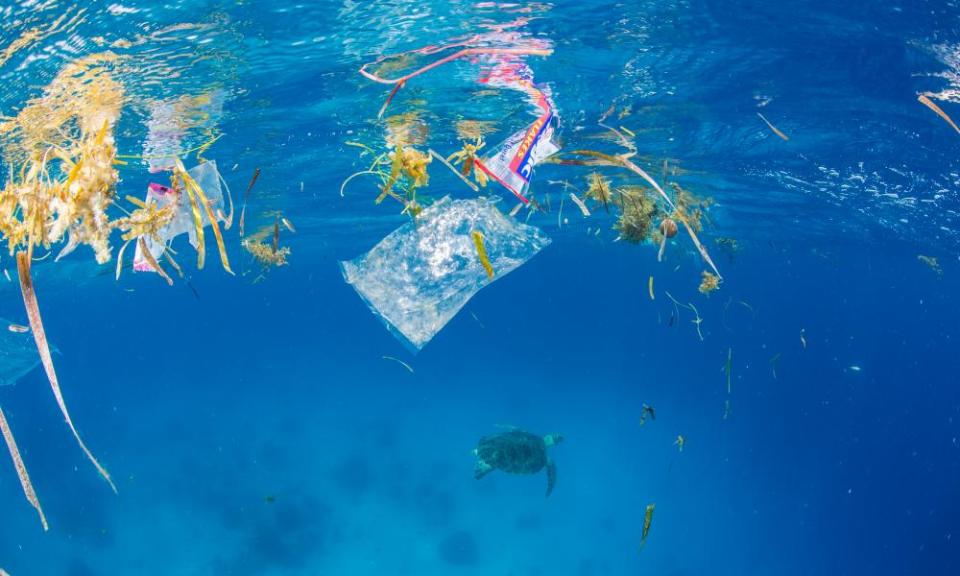In its own ‘war on plastic’, the UK government is a deserter

The prime minister has declared war on plastic, with an announcement that the government hopes to “eliminate all avoidable plastic waste” within 25 years. You could say that this week saw the first troops landing on our plastic-strewn beaches. But, rather than our ministers or MPs, they turned out to be the shelf-stackers and checkout workers of Iceland supermarkets.
Those shop workers could well be among the first to handle a new kind of plastics-free packaging that the world so badly needs. While the war may last well beyond next Christmas, Iceland has pledged victory over plastic packaging within five years – 20 years ahead of Theresa May’s deadline. This is, of course, good news, because the government’s war wasn’t looking likely to liberate anything any time soon.
A truckload of plastic waste enters our oceans every minute, much of it packaging, and it poses a threat to everything from the smallest plankton to the biggest whale. It breaks down into microplastics, which like a billion tiny sponges collect any toxic chemicals they encounter, concentrating these as they pass up through the food chain to big, predator species – including most of the fish we eat.
If we set 2043 as a deadline for solving this grievous problem, then it will, of course, be far too late for many species – and probably for entire ecosystems. A supermarket seems to have a grasp of the response this threat demands, and it is against these new commitments – and not the government’s ambition – that other retailers will be measured.
Of course, I’m aware Iceland’s plan is a relatively small response to an overwhelmingly huge problem, applying only to 1,000 or so own-brand products. Some of its plastic packaging may turn out to be very tricky to replace. But the implications are massive. The move strikes the vital note that such problems are solved by taking action, not by waiting until someone else does or the government forces you to. The more supermarkets that follow this bold move, the more research will be done into alternatives, and the more pressure will be put on the big plastic-wrapped brands to follow their lead.
The public, media and politics are aligned – we’re not going to get a better chance to confront this issue
And now, not tomorrow, is the time to do so. UK supermarkets generate 1m tonnes of plastic packaging every year, which amounts to more than a quarter of the country’s entire plastic usage. Globally, just 9% of plastics is recycled, with 72% ending up in landfill or the sea. From the sea it gets everywhere, the bottom of the deepest ocean, Arctic ice floes, table salt, tap water, beer and the stomachs of seabirds, whales, turtles and humans.
I’ve been banging on about one particularly pernicious product for years: the ubiquitous plastic-lined, recyclable-so-long-as-you-can-afford-to- get-Nasa-to-do-it-for-you coffee cup.
It has been heartening to see the issue of such badly designed packaging climbing up the agenda, but so little of that noise has transferred to action. Westminster’s environmental audit committee put out a report addressing my own personal bete noir (and bête au lait) – coffee cups. If the government is to show any teeth at all, it must bring on the 25p latte levy (a charge on disposable takeaway cups), and a deposit-return scheme for plastic bottles (which achieves a 98.5% recovery rate in Germany – nearly double the UK rate).
David Attenborough’s stunning Blue Planet II may just have marked, well, a sea change. The public is concerned, the media are supportive, the politics are aligned – we’re not going to get a better chance to confront this issue. It must be now. The EU recognised the problem with new regulations on plastic packaging last week, and forward-looking companies are taking steps to stay ahead of the debate by banning plastic straws, earbuds and other poster products of bad design.
And yet most supermarkets are still keeping their heads down and hoping the plastic storm blows over while bringing out pre-chopped onions and “cauliflower steaks” perched on plastic trays and wrapped in even more avoidable plastic. A quarter-of-a-century ambition will have had retailers sighing with relief: it’s a problem for their chief executives’ successors’ successors. They can feel safe in shelving any plans for investing, researching or trying out alternatives to plastic, let alone going as far as actually getting rid of the stuff.
Retired retail moguls wrote to the Financial Times last month to say that recycling plastic is not enough – “it is therefore essential that retailers and packaging manufacturers work together to turn off the tap of throwaway packaging”. Easy to say when all you’re managing is your pension fund, but they are right: it is essential. And Iceland is showing that what is essential is also possible.
• Hugh Fearnley-Whittingstall is a food and cookery writer, broadcaster and campaigner

 Yahoo News
Yahoo News 